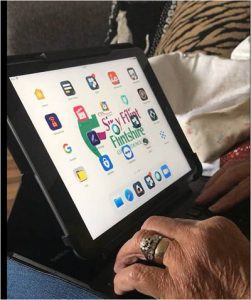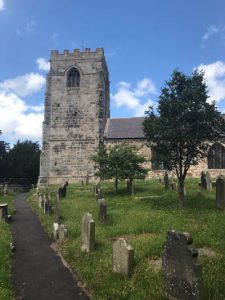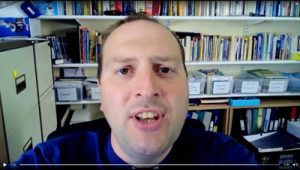How Social Media Came to the Rescue
Last month’s article outlines the pandemic response and how Hope, Caergwrle and District Voluntary Action Group delivered essential supplies of food and medicine to residents.
Local Volunteers
The article described the dedicated involvement of local volunteers who were responsible for making the system work effectively. Towards the end of May, when lockdown restrictions were starting to ease in Wales and England, several of the volunteers found that they had to return to work or give more time to their other commitments. It has been a balancing act for everyone.
This reduction of active volunteer members coincided with a sharp rise in the number of coronavirus cases in north- east Wales. Reinforcing the need for service users to stay at home. There was also an increased workload in terms of pharmacy deliveries. For a moment, it seemed that the organisation would not be able to cope with the changed situation.
Facebook to the Rescue!

As Matt Zeqiri had used Facebook to launch the group, it was the obvious choice for a recruitment vehicle. A request went out for further volunteers who possessed the necessary enhanced DBS certificates. At this stage, it was not clear whether we would be able to recruit sufficient numbers, especially with a return to work in England. It significantly affected a local workforce so close to the border.
The immediate response was terrific: direct messages came flooding in almost immediately from suitable volunteers.
The IT skills of various members had been instrumental in establishing a working model for group activities. Their input allowed us to create a highly- effective aid to the delivery of the service. Making full use of WhatsApp, email and the combined use of a Google spreadsheet.
Amazing Response
Once we checked volunteers’ DBS certificates, they were quickly added to the WhatsApp group and given access to the Google Spreadsheet. Other volunteers were amazed at the extent of the response and those who were all too familiar with the negative aspects of social media jokingly commented that “Faceache’” had actually come up trumps!
What was happening locally was an, albeit primitive, manifestation of how technology was globally combatting the impact of the virus. The development of new and advanced technology allowed the identification of the virus genome and to develop techniques to track, test and protect populations. This kind of response had never happened on such a sophisticated scale before although the period of innovation was not without its hiccups and technical problems.
A Historic Precedent
While social media might seem to be an essential tool nowadays, this was, nevertheless, the first historical example of the internet helping local communities within the context of a global emergency. The new volunteers received their welcome packs and were able to slot in quickly because of the simplicity of the system that we had developed. It is difficult to imagine how the group would have met the needs of residents in isolation without the modern- day aids offered by technology.
Previous global crises have led to long-term societal changes, some of which we could not have foreseen at the time. Whatever the long-term effects of the Covid-19 outbreak may be, it is quite apparent that new and more fully developed ways of working remotely will become a prominent feature of the “New Normal” after the pandemic.
A Highly-Professional Approach
Feedback from service users was full of compliments. It seems likely that the insistence of enhanced DBS certificates meant that volunteers approached their work in a highly professional way that was a credit to the organisation.
Service-user experience is well represented by comments which were made on Facebook by Mrs Debbie Davies:
“Thank you very much for this wonderful group. I rang for the first time today and my medication came straightaway. It was such a relief being able to ask for help without feeling like I was a burden. It didn’t feel like I was imposing because I knew the group were happy to help (or wouldn’t have volunteered).
“Please do recommend them to anyone who might be struggling. Not only have I got my tablets, but I haven’t lost my dignity in asking. The volunteers I spoke to didn’t interrogate me; they were just genuinely happy to support. It has taken such a weight off my mind. Thank you so much for your generosity and compassion in reaching out to perfect strangers. You’re absolute heroes.”
This contact with members of the community in isolation was much appreciated. One elderly resident, who lived through the Second World War, made a pertinent comment which touched on the psychological impact of the lockdown;
“Although there were real problems during the War, it was not this bad in that we could go out. We could mix and meet people and go to the Derby Cinema several times a week if we wanted. The isolation made it worse this time.”

Lockdown Relaxations
On 31st May, after 10 weeks of lockdown, the Welsh Government announced relaxations to the regulations from 1st June. These included allowing those who had been shielding to exercise outdoors with people from another household.
It was apparent that the virus spread less vigorously outside, but the Government was also undoubtedly aware of the impact the lockdown was having on mental health. This change did not permit vulnerable people to go shopping or attend work outside the home, however. Despite the slight relaxation, volunteers would still be required to help with deliveries to these people and others who were self-isolating.
The week beginning 1st June 2020 was nationally recognised “Volunteers Week” when tribute was paid to volunteers all over the UK who were involved in efforts to combat the effects of the pandemic. Locally, Reverend Adam Pawley posted a short video on the WhatsApp group page to acknowledge the valuable work which was going on. Hope Parish Church had been involved extensively in online activities to raise local morale throughout the lockdown. Adam had reached audiences of around 1,500 for his online Sunday Services and also via a much-appreciated weekly email to parishioners.
Paying Tribute to Volunteers

The Rev Pawley paid tribute to the volunteers who helped deliver food, medication and also walking dogs for members of the community. Those receiving help included members of Hope Parish Church and his address to volunteers played on the place- name of “Hope”:
“I think you are doing a fantastic job. I feel proud to be part of the local community where we Help Other People Everyday – HOPE.”
Hope Parish Church was also closely associated with the administration of the Charitable Incorporated Organisation of Hope United Charity. It did its best to publicise the support for residents that could be available to those who might be experiencing financial distress as a result of the pandemic.

In next month’s article, we hear the voices of the volunteers as they tell their stories about their involvement.
Readers are welcome to contact the author with any news or views at dhealey204@aol.com or by telephoning 01978 761 523.
The cover photo of Hope Church is courtesy of Grace Wood Photography
Thank you for reading ‘The Alyn Villages Covid-19 Pandemic Response – Part Two’. Read part one here.

